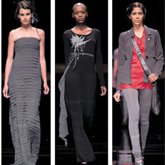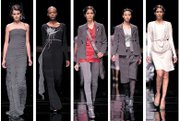South Africa Style Comes to California
Despite South Africa’s burgeoning fashion scene, the country’s production delays, sizing differences and opposite seasons have kept many South African designers from breaking into the U.S. market.
Diane Kalil founded BigCat Designers in the hopes of overcoming these hurdles.
Kalil distributes several South African labels in the United States, warehousing goods in Southern California to ensure prompt delivery.
BigCat has sold to stores throughout California, including Le Bel Age in San Diego, Holly Hills in San Carlos and CJ’s Elegance in Los Angeles, as well as stores across the United States, including New York, Illinois, Washington and Texas.
Most recently, Kalil showed the collections in Las Vegas at WWDMAGIC, where for the past two seasons, Nordstrom’s Treasure & Bond charitable concept store picked up lines by designers Terrence Bray, Leigh Schubert and Colleen Eitzen.
“It has been really exciting to see the response and reaction to the collections,” she said. In general, they have been well-received, although many stores want to be sure the designer will still be around the next season before buying, she said.
Despite the wealth of talent in South Africa, many designers have had a hard time finding U.S. retailers that are willing to gamble on the potential headaches involved with importing from a country in a different hemisphere with a struggling apparel industry. In recent years, South Africa has had to contend with increasingly outsourced manufacturing and cheaper textiles and clothing imported from China and India, which has nearly decimated the country’s apparel industry and led to widespread layoffs and factory closings.
“There are many challenges, and I think that’s where having BigCat handling the U.S. side of the business for the designers helps make it easy for them,” Kalil said. “The biggest challenge is working in different hemispheres, which means different seasons, as well as different time zones. [The designers] also have an existing customer base to supply in South Africa, and it’s easy for them to get lost in the local South African market and ‘lose track of time,’ so to speak, for our U.S. market.”
Kalil helps keep the designers focused on the timelines for the U.S. market and gives them deadlines and regular reminders to keep production on track. She also works with them on producing the clothing in U.S. sizing since South African sizes run smaller.
Once the production orders are manufactured in South Africa, BigCat has the apparel shipped to Long Beach, Calif., where the clearing agent handles the import clearing and sends the merchandise to the Los Angeles office to be shipped to U.S. retailers.
“The beauty of this arrangement is that the designers can focus on what they do well, and BigCat takes care of the logistics and business side of the U.S. orders,” Kalil said.
For the last two seasons, the collections were shown in a showroom in Los Angeles’ California Market Center, but Kalil is currently working on securing new agents who will not only have showrooms in Los Angeles and New York but also travel to customers.
Kalil is a native South African and longtime fashion designer who moved to Los Angeles two years ago to open an office for Limaco Clothing, her design and manufacturing company that supplies clothing to South Africa’s largest commercial retailers. Once here, she realized the need for representation for other South African designers.
As someone who has worked in the industry for more than 26 years, she said her experience gave her the background and contacts to showcase the designers and navigate the logistics of importing and distribution.
Kalil has represented seven South African labels over the past three seasons, including Schubert, Bray, Eitzen, Nucleus, Lunar and Black Coffee. In addition to Johannesburg, many of the brands hail from Durban and Cape Town, which are both known for their emerging designers.
Kalil selects designers based on their “unique point of view,” authentic design and commercial appeal. Additionally, each company must have the capability to execute orders placed by U.S. buyers and adhere to sizing differences, seasonal delivery periods and export compliance.
“My mission is to develop the South African export market by bringing the best of South Africa’s established fashion houses to the United States, using BigCat as the marketing, sales and delivery vehicle,” she said.
While each designer has a unique style, all of them tend to have a distinct South African “ingenuity” that stems from working with limited resources, she said.
“I think this has given them a creative edge and forced them to be innovative, which is what fashion is all about.”























